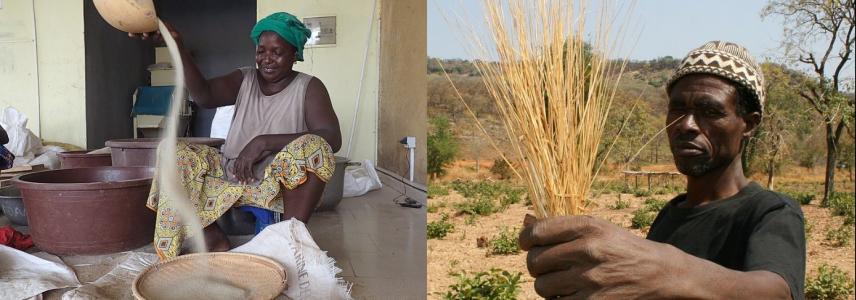European companies share their views on teff and fonio

Webinars on the ancient African grains fonio and teff took place on 26 November and 4 December 2020. The webinars raised several questions about the potential of these grains in Europe. For example, does the current supply from Africa meet European standards? What needs to be done to get these grains on the European market? And what can you do as an exporting company?
CBI discussed these topics with support from the companies:
- Aduna, UK;
- Symfonio, the Netherlands; and
- Neupert Ingredients, Germany.
What is the potential for teff and fonio in Europe?
There is a growing demand for gluten-free and healthy grains. Teff and fonio thus have great potential to gain market share in Europe. There is still a large gap to be filled compared to the import volumes of other grains, such as millet, buckwheat or quinoa. Fonio and teff are often compared to quinoa. Currently, Europe imports 28,000 tonnes of quinoa. Like quinoa, teff and fonio are healthy grains with a long history of traditional consumption. This makes them authentic and attractive to European consumers.
Table: European Union (EU-28) imports of speciality grains in 2019
|
Special grain |
Description |
All origins (including Intra-EU trade) |
From non-EU origin |
||
|
tonnes |
x €1,000 |
tonnes |
x €1,000 |
||
|
Quinoa |
gluten-free pseudocereal |
44,185 |
129,257 |
28,001 |
70,114 |
|
Millet |
small-seeded grass variety for feed and human food |
120,061 |
56,138 |
53,349 |
24,518 |
|
Buckwheat |
gluten-free pseudocereal |
83,462 |
39,212 |
7,977 |
2,536 |
|
other niche cereals |
including teff, amaranth, and so on. |
139,571 |
64,573 |
5,655 |
12,848 |
|
- Teff |
Gluten-free grain |
<2,000 |
|
<1,000 |
|
|
Fonio |
‘Novel food’ gluten-free grain |
270 |
205 |
195 |
178 |
Sources: ITC Trade Map, Eurostat, Market Access Database
Does the current supply of African fonio and teff meet European standards?
Teff and fonio have not had an easy start in Europe. The sale of teff in Europe was restricted by a patent. Also, Ethiopia, the main producer of teff, still has some restrictions on exporting unprocessed grains. Fonio is officially a novel food. It was recently authorised as a traditional food under the novel food regulation.
Some challenges have been dealt with. But suppliers still have a big challenge in meeting all the food safety requirements of the European market. To meet European standards, you need a Hazard Analysis Critical Control Point (HACCP) certified supply chain and high quality standards. Also, Corporate Social Responsibility (CSR) must be addressed. Small farmers produce and manually process a large share of fonio and teff. Exporters that want to be successful in the European market should focus on having a traceable supply and certified processing.
How do you get fonio and teff onto the EU market?
During the webinars, many suppliers wanted to know how to get their product onto the European market. Teff and fonio are still niche markets in Europe. The demand for these grains is still developing. To help increase demand, teff and fonio need a lot of promotion. Some of the companies interested in these ancient African grains include:
- Millets Place;
- Tobia Teff;
- Teff Inside;
- Obà food group;
- Gaia;
- Aduna;
- Symfonio; and
- Ibemi Food.
Working together with these early adopters is extremely important for the marketing of fonio and teff.
Several companies have developed products made from fonio or teff. Examples are pasta, bakery products, sports nutrition and gluten-free snacks. New products can help get the attention of European consumers. Most of this product development takes place within Europe.
Is there a chance that Europe will take over the supply?
African suppliers show concern about Europe taking over the production and supply of teff and fonio. European production would be preferred as it lowers the risk of standards not being met. Also, a short supply chain is more sustainable. There are already several farmers that have started to produce teff. Still, it is not likely that Europe will take over the entire supply. European farmers cannot be competitive with these tiny grain varieties.
For African exporters, it is important to make the grains sustainable and meet European standards. Tell your story and show how your product contributes to your local communities. This can make you more attractive as a supplier. Visibility is important to get noticed by potential buyers. But, do not expect to export large volumes in the short-term. Make sure you have other products and markets that you can sell to.
For more information, watch webinar 1 and webinar 2 on ancient African grains. Also, read the European market studies for teff and fonio.
ICI Business wrote this news article for CBI.
Stay informed
To stay informed on the latest developments in the grains, pulses and oilseeds sector, subscribe to our newsletter.